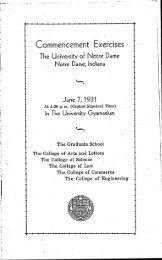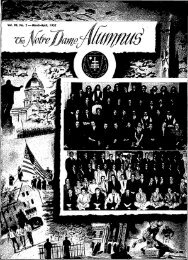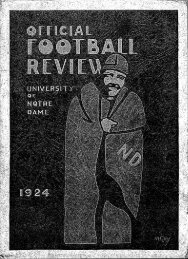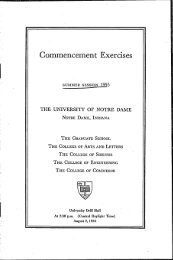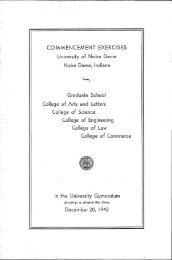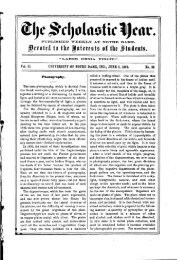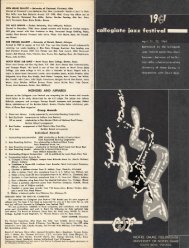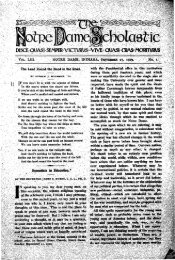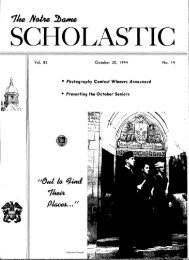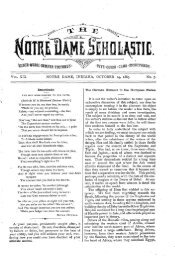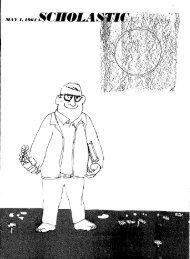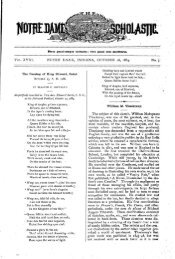Catholic Lawyers' Guild Progresses - Archives - University of Notre ...
Catholic Lawyers' Guild Progresses - Archives - University of Notre ...
Catholic Lawyers' Guild Progresses - Archives - University of Notre ...
You also want an ePaper? Increase the reach of your titles
YUMPU automatically turns print PDFs into web optimized ePapers that Google loves.
June. 1937 The <strong>Notre</strong> Dame Alumnus 241<br />
BcToare lest any man cheat you by philosophy<br />
or vain deceit; according to the<br />
elements <strong>of</strong> the world, and not according to<br />
Christ,"—Coloss, 2-S,<br />
Every period <strong>of</strong> history has its own<br />
peculiar characteristics. The dominant<br />
note <strong>of</strong> our times is uncertainty,<br />
confusion and instability. There are<br />
scholars <strong>of</strong> great authority who express<br />
the conviction that we are<br />
approaching a crisis in our civilization,<br />
if in fact it is not already here.<br />
Superficially the crisis appears to be<br />
political, social and economic. Actually<br />
these are only symptoms <strong>of</strong> a<br />
much more pr<strong>of</strong>ound distemper. The<br />
world is sick in its soul. It is out <strong>of</strong><br />
joint spiritually and religiously.<br />
That this judgment is not merely<br />
an individual one but represents<br />
rather a consensus <strong>of</strong> world opinion<br />
is abundantly clear from the pronouncements<br />
<strong>of</strong> contemporary criticism.<br />
Christopher Dawson in England,<br />
the most respected <strong>of</strong> oar Christian<br />
sociologists, makes this statement:<br />
"Today the world is on the<br />
move again, and no one can tell<br />
where it is going or what will happen<br />
next; whether our civilization is<br />
going to recover its stability or<br />
whether it will collapse in ruins."<br />
Problem Is Religious<br />
In another place he states the<br />
cause and also cites the remedy. "The<br />
central conviction which has dominated<br />
my mind ever since I began to<br />
wTite, and which has increased in intensity<br />
during the last 20 years, is<br />
the conviction that the society or<br />
culture which has lost its spiritual<br />
roots is a dying culture, however<br />
prosperous it may appear externally.<br />
Consequently the problem <strong>of</strong> social<br />
survival is not only a political or<br />
economic one; it is above all things<br />
religious, since it is in religion that<br />
the ultimate spiritual roots both <strong>of</strong><br />
society and <strong>of</strong> the individual are to<br />
be found."<br />
Let me repeat that this is not an<br />
isolated verdict. Dawson has many<br />
companions who share his views not<br />
only in England but on the Continent<br />
<strong>of</strong> Europe and here in America. In<br />
The Baccalaureate Sermon<br />
By Most Rev. Karl J. Alter, D.D..<br />
Bishop <strong>of</strong> Toledo, Ohio<br />
Speaker Charges the 1937 Graduates<br />
With the Responsibility <strong>of</strong> Being Intel<br />
lectual, Articulate and on the Offensive.<br />
France v>-e can mention such celebrated<br />
scholars as Jacques Maritain,<br />
Paul Claudel, Gilson and Mauriac.<br />
In Germany there are Peter Wust<br />
and Karl Adam.<br />
In America there is an entire host<br />
<strong>of</strong> writers who echo the same sentiments.<br />
Among the non-<strong>Catholic</strong> critics<br />
similar views are expressed. Oswald<br />
Spengler, the German sociologist,<br />
writes a book on the Decline<br />
<strong>of</strong> the West; Nicholas Berdyaev, the<br />
Russian author, on the End <strong>of</strong> Our<br />
Times; Irving Babbitt, late <strong>of</strong> Harvard,<br />
Paul Elmer Moore <strong>of</strong> Princeton,<br />
and Walter Lippman, <strong>of</strong> literary<br />
fame, all concur in the same analysis<br />
<strong>of</strong> our modern unrest and instability.<br />
The latter <strong>of</strong>fers the following trenchant<br />
criticism <strong>of</strong> present day American<br />
attitudes: "There is nothing<br />
BISHOP ALTER<br />
new in the fact that men have ceased<br />
to believe in the religion <strong>of</strong> their<br />
fathers, but this is the first age in<br />
the history <strong>of</strong> mankind when the circumstances<br />
<strong>of</strong> life have conspired<br />
with the intellectual habits <strong>of</strong> the<br />
time to render any fixed and authoritative<br />
belief incredible to large masses<br />
<strong>of</strong> men.—The irreligion <strong>of</strong> the<br />
modern world is radical to a degree<br />
for which there is, I think, no counterpart."<br />
Ever since the days <strong>of</strong> the Renaissance<br />
we have been moving towards<br />
a complete secularization <strong>of</strong> society.<br />
It was the great misfortune <strong>of</strong> our<br />
world that the leaders <strong>of</strong> that movement,<br />
otherwise so beneficial, erred<br />
egregiously in their appraisal <strong>of</strong><br />
human values and fimibled the relation<br />
and distinction between nature<br />
and grace. They grossly exaggerated<br />
man's perfectibility by merely human<br />
means. They placed a false estimate<br />
on the ability <strong>of</strong> man to achieve unrestricted<br />
progress by dominating<br />
merely his physical environment and<br />
external nature rather than by mastering<br />
his own inner self, thereby<br />
establishing a divine synthesis between<br />
nature and grace. The train<br />
<strong>of</strong> events set in motion by the Renaissance<br />
is only now reaching its<br />
ultimate conclusions. Such is always<br />
the course <strong>of</strong> false philosophy.<br />
Life Has Lost Meaning<br />
Karl Adam states: "The sixteenth<br />
century revolt from the Church," he<br />
tells us "led inevitably to the revolt<br />
from Christ <strong>of</strong> the eighteenth century,<br />
and thence to the revolt from<br />
God <strong>of</strong> the nineteenth. . . And thus<br />
life has lost its great meaning, its<br />
\'ital strength and high purpose, its<br />
strong pervading love, that can be<br />
enkindled only by the divine."<br />
Christopher Dawson says practically<br />
the same thing: "Protestantism,<br />
Liberalism and Communism are the<br />
three successive stages by which our<br />
civilization has passed from <strong>Catholic</strong>ism<br />
to complete secularism. The<br />
first eliminated the Church, the second<br />
eliminated Christianity, and the<br />
third eliminates the human soul. We<br />
cannot have a Christian society, or a<br />
Christian economic life until our civilization<br />
has recovered its moral conscience,<br />
its faith in God and its membership<br />
<strong>of</strong> the Church."<br />
During the past 400 years the<br />
Church has not been able to lead a<br />
normal life. She has been forced to<br />
stand upon the defensive. She has<br />
been like a country that is invaded,<br />
like a city that is beseiged. Her energies<br />
have been absorbed in fighting



